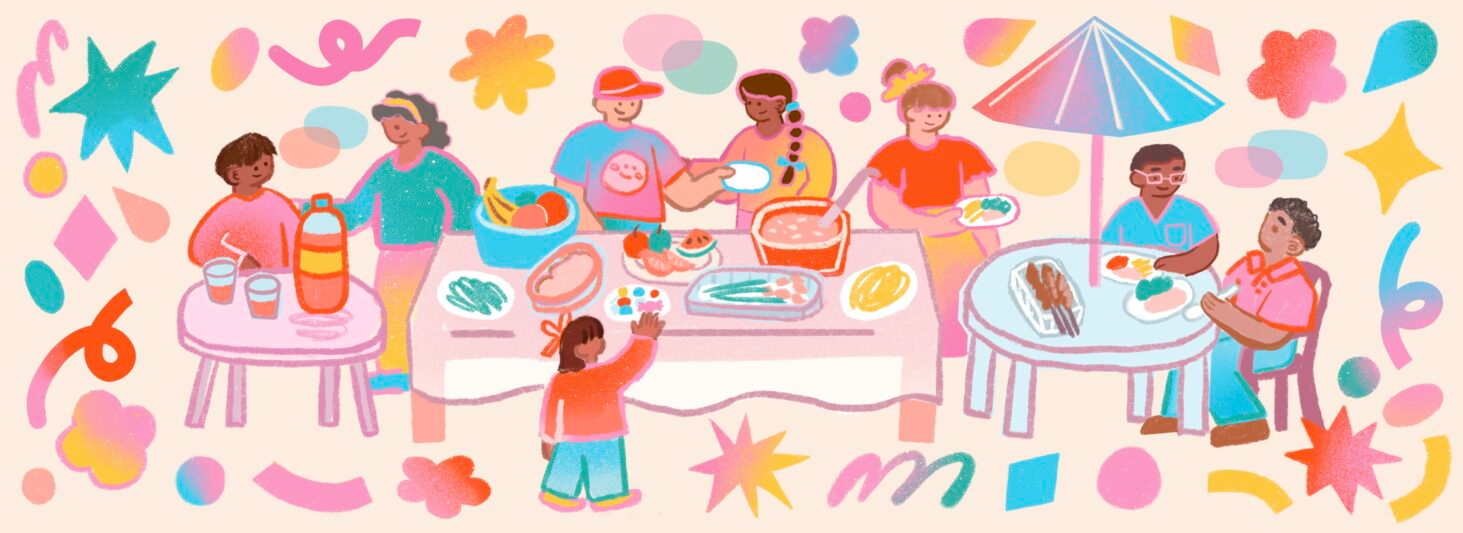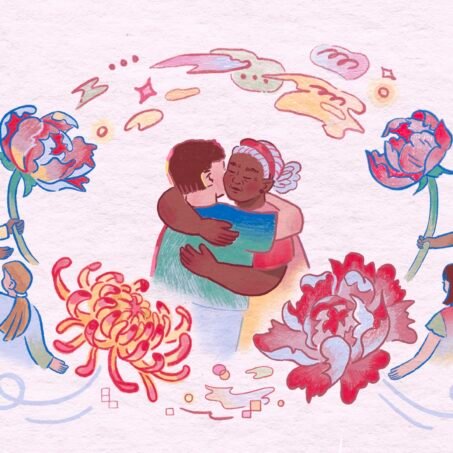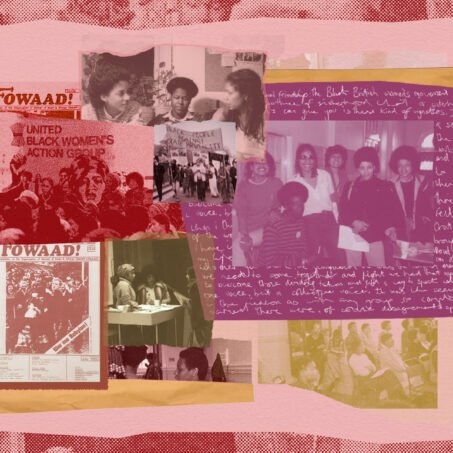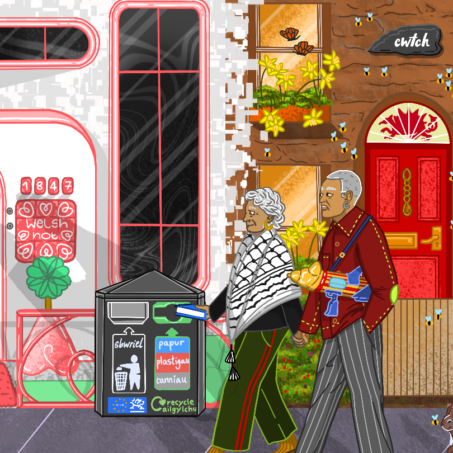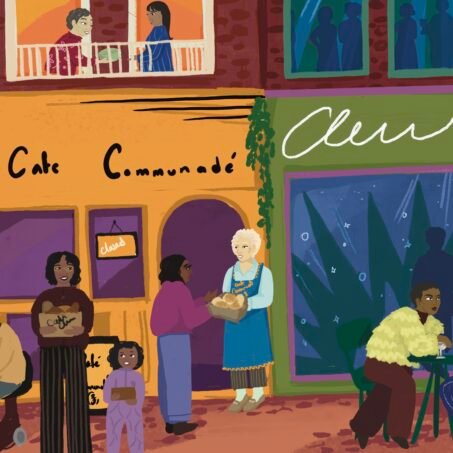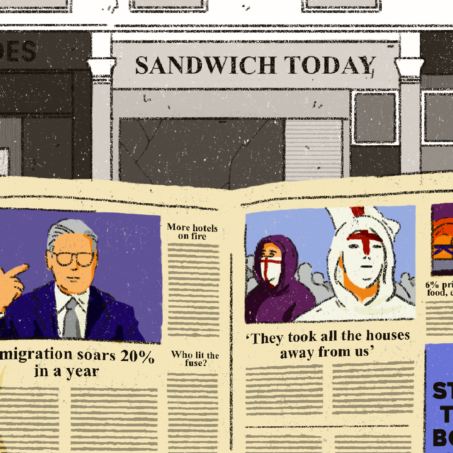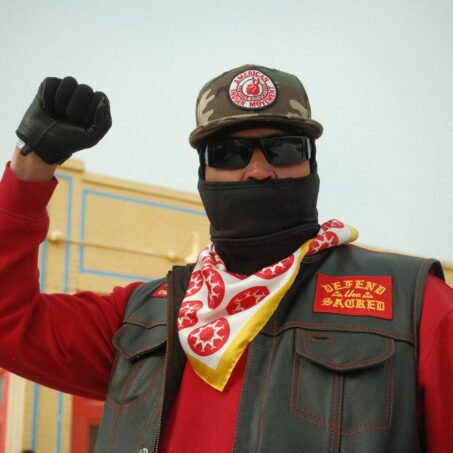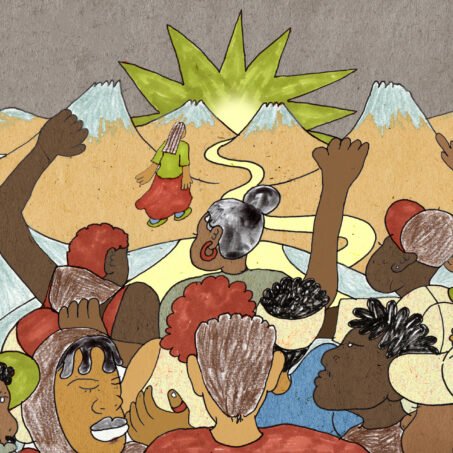Many of my greatest childhood memories as a second-generation Filipino are being nestled inside someone’s house, surrounded by rows of steel chafing dishes loaded with food and karaoke filling the rooms with song. Certainly, it was always my favourite time of the week.
It’s 2024, and I still find myself in similar circumstances. Except this time I’m older, sat around a table with parents, titos (uncles) and titas (aunts), reflecting on the importance of the fiesta as a community-building practice. Truly a necessary mechanism for Filipino migrants and an embodiment of bayanihan – a Filipino Indigenous pedagogy capturing the “lifestyle, consciousness, decision-making, and character of Filipino communities.” I look around and wonder, how has this community been established so quietly yet sustained so resiliently?
Mainstream cultural dialogues about the experiences of the Filipino diaspora in the UK are few and far between, so I felt an intimate conversation with my closest relatives necessary to understand the cultural values that have transcended national borders, into the homes and communities of the diaspora.
A home away from home
It’s estimated that at least 10% of the population of the Philippines work or live abroad. While each story of migration is unique, most are characterised by labour – that is, moving to a different country for work and economic work opportunities. In 1974, the Filipino government formalised this culture of migration through introducing the Labor Code of the Philippines and organised international government-backed programs.
In the case of the UK, Filipinos account for the largest South-East Asian diaspora group in the country. A great number of these migration stories can be attributed to overseas recruitment for the National Health Service.
Indeed, most of my family around the table work for the NHS; some have continued working as engineers, whilst others have pursued occupations in healthcare despite being attorneys and policemen back home (a commonplace sacrifice). They agreed that yes, they were brought together through the workforce, but it was an undeniable camaraderie that established their senses of belonging.
“When we first arrived, our priority was to establish ourselves – life was only work and home,” says Tito R.
Together, they look back on their period of arrival to a new country. The difficulties, the cultural differences, the weather, the different way of talking, the different way of nursing. It was more important than ever to uplift each other through the uncertainty. Tita Joie admits, “It was hard. We were worried about criticism, especially at work, and always feeling like we had to prove ourselves.”
Luckily, it seemed those doubts and insecurities were remedied by the promise of returning to a bustling house share of fellow Filipinos (all but a few roads away from one another in Southall), which trusts and agencies usually arranged. New friendships developed over time, and they natter about how the situations and circumstances were soothed by “a shared dream” – a dream that they’d earn enough to provide financial support to their families back home.
Once that state of affairs was settled, they began to build their own lives, families and communities. The kababayan (fellow Filipino) affection nurtured the empowered foundations that uplifted them in navigating their host countries.
The significance of the Fiesta
At its core, The Filipino fiesta embodies a rich cultural tradition of celebration. It was only after I’d grown up that I realised how important these seemingly mundane parties were for us, a main point of socialisation. As such, I see the fiesta as a practice of instinctive community-building, exercising their agency to invite nostalgic comfort through food, conversation and singing. Again, where the bayanihan and kababayan spirit ring true.
I ask my family whether fiestas are important to them and before I even finish my sentence, I am met with a unanimous sea of nods. “We loved a big party!” says Tito R. “Everybody was invited.” And indeed, these invitations extended the Filipino diaspora too – welcoming new friends, colleagues and acquaintances of diverse cultural backgrounds.
It’s important to sense the value of unconditional inclusivity in building strong communities. The value of being part of something that completely embraces those who come to be in it, never alone and never left behind.
For Filipinos, like many, there is an enormous cultural significance of food and eating together. As guests trickled in with their own dishes , the tables would quickly hold a vibrant feast of classic dishes such as chicken adobo, lumpia and pancit. It filled the air with a fusion of savoury aromas, overshadowed by a sweetened smoke from the pork skewers being barbecued outside. You couldn’t help but eagerly anticipate hearing the words ‘kain na’ (let’s eat), followed by somebody handing you an empty plate with some cutlery – free to be adorned with whatever you liked.
On a basic level, making efforts to feed and look after your peers illustrates their duty to care for one another. At certain points of the party, I recall many people would be in their blue NHS uniforms, chatting away over their filled plates – waiting for when they had to load up some tupperware with food and dart off to make their night shift at the local hospital.
Interestingly, the act of feeding itself was not the only way in which these parties bonded people together – equally important was what they were being fed. My family tell me about people making different regional dishes and sharing variations of recipes; where different culinary influences throughout the archipelago found themselves under one roof.
“Even though you’re from the same country, everyone has their own style of regional dishes – you discover different cultures and specialities,” my mother says. In agreement, the rest of my family reflect on the beautiful connection that is created – a sentiment that no matter where you are from in the Philippines, you are all united regardless.
These perspectives serve as a crucial reminder that ethnic minority groups (particularly Asian ones) are not monolithic, and cannot be subject to such cultural generalisations. Rather, they are bonded through celebrating the differences of each shared experience. And seeing as we can resist these myths simply through the food on our dining tables, we too can understand how the global Filipino identity has preserved itself.
A time to check in
Another important aspect of these parties was the kwentuhan – meaning storytelling or chitchat. Tita C chimes in: “It was a time to reconnect and make sure everybody was okay.” Fiestas therefore provided necessary opportunities to catch up and talk about their experiences; their struggles and successes.
She continues: “Even nowadays, I look forward to going to fiestas! It’s socialising and it’s good for my mental health.” It was and remains a space where they would cooperatively provide advice, motivation and support to one another – an invaluable practice of engaging in knowledge sharing.

Join our mailing list
Sign up for shado's picks of the week! Dropping in your inbox every Friday, we share news from inside shado + out, plus job listings, event recommendations and actions ✊
Sign up for shado's picks of the week! Dropping in your inbox every Friday, we share news from inside shado + out, plus job listings, event recommendations and actions ✊
Nowadays, being able to participate in these discussions, I’ve come to appreciate the relentless wisdom (though sometimes subject to disagreement) that oozes from my surroundings. And I begin to wonder how many of the life lessons and stories passed onto me, were birthed from something as humanly instinctive as a conversation at a party.
As years went by, the communities naturally expanded and split off into their own groups – but the power of those social gatherings, when they were adjusting to a new home, will never be underestimated.
Beyond the home: the physical and the digital
Whether it be churches, basketball courts, Filipino (‘Pinoy’) grocery stores and restaurants, occupying spaces beyond the home are integral for our community’s sense of belonging.
After discussing their trips taken to Pinoy stores in Earls Court, Tita T says: “You don’t feel so homesick because some things feel very familiar.” Generally, these kinds of stores nod to the histories of their home countries whilst playing a part in creating a third space for interaction.
Importantly, spaces like these foster connections with fellow Filipinos beyond usual geographic concentrations. We are currently seeing a boom in Filipino-owned businesses up and down the country, which has allowed for older generations, as well as younger ones, to enjoy the novelties of Pinoy lifestyle together. I recently visited the Filipino owned Allan’s Bakery in Shepherds Bush and saw a group of older women sitting around a table facing a mounted TV above. The growing flock of teenage customers coming in and out couldn’t help but stop and face the TV either – and soon enough, they were all deeply and equally invested in this teleserye (a Filipino soap opera). It was quite amusing.
The effect of the pandemic
It’s not just these vital physical spaces which are important. Back at the table, we talk about the importance of social media and digital spaces. For many older Filipinos, Facebook will remain a pillar of preserving and documenting memories, as well as providing direct communication to their counterparts across the globe.
The pandemic was testament to the importance of digital spaces. During the multiple lockdowns, our innermost cultural values, like bayanihan, were put to the test. In spite of Filipino healthcare workers, many became the faces of the frontline at the time. In sobering statistics that shook the entire community, mortality due to Covid-19 amongst Filipinos was the single largest in terms of nationality. This triggered passionate calls to recognise Filipino NHS workers as a standalone ethnic group on their electronic staff records – which were successful.
The facts of the pandemic created an even stronger sense of resilience and unity amongst the community. It’s a period of time we won’t forget for many reasons, but it also displayed how camaraderie helped (although did not mitigate all the trauma and sacrifice) many get through a particularly horrible period. “We really suffered,” Tita C sighs. “We lost many friends and family – but I am just grateful to God and for the support we gave each other.”
My family, and wider community kept each other motivated online and would provide financial support to each other if necessary, delivering groceries and home-cooked meals to their homes.
The pandemic not only affirmed the grit of our networks, but also ignited a profound need to represent our experiences. Nevertheless, organisations and associations like Kanlungan UK have historically provided a platform to many Filipinos, but arguably the pandemic has created more of a personal demand to tell the stories of the diaspora. For example, Tinig UK was created during the pandemic as a retort to the lack of reliable information regarding the pandemic’s effect on the Filipino community.
Intergenerational dialogues
25 years on from the first fiesta table I sat around, a conversation with my family and friends have left me with more questions than they did answers. That being said, I was left in adoration. The space we created allowed for their own self-reflection on their journeys and the ability to recognise their potency and grit, where they established a base foundation in a new country. I strongly believe it is my generation’s privilege and duty to build on.
Where there are these research gaps, intergenerational dialogues will allow us to understand our own cultural evolution in the UK. After speaking with my family, I began to think perhaps the stereotypical associations of the community’s relationship to work, goes some way in explaining why many Filipinos had felt invisible in the British mainstream. Our stories of migration and cultural imagination have been lesser explored in traditional media, and instead viewed homogeneously under our contribution to the workforce.
Excitingly though, we are seeing an invigorating rise in representation of Filipino-British experiences in the arts and culture sectors too. I’ve been fortunate enough to have been to and encountered some really moving Filipino cultural experiences, particularly in the past 2 years. To just take a few examples; the Migration Museum’s exhibition ‘Heart of The Nation’ tells similar anecdotes and representation of the experiences of Filipino NHS workers. Maharlika UK is a platform dedicated to reconnecting with Filipino identity through art and challenging sentiments that our experiences “must be heard in order to be accepted”. Jules Chan’s play ‘English Ako’, is an exploration into the journey of a Manila-born boy, raised in England and the complications of navigating one’s identity.
Of course, these developments do not negate the fact that inclusion and representation in the British mainstream doesn’t remedy necessary systemic changes and intergenerational understandings of ourselves. We have thrived without conventional representation in the UK for years, and we will continue to do so without it. But I am hopeful we are verging on newer horizons, where representation isn’t an earned privilege, but a mechanism to celebrate our culture. It’s vital to have these conversations and curiosities, so we can navigate our identities whilst honouring the history, heritage, struggles and joys of those who came before us.
What can you do?
- Read Tikim: Essays on Philippine Food and Culture by Doreen Fernandez. This book explores the cultural importance of food in Filipino culture, how dishes differ across the archipelago and examines the sociality of our cooking and eating habits.
- Follow and organise with Anakbayan UK. This organisation aims to educate the Filipino Youth diaspora through socio-political and cultural education. They host a number of events which are rooted in a strong reconnection to Filipino identity.
- Check out the Tinig UK website. There you can find updated news and information relevant to the Filipino community in the UK. You can also listen to various podcasts and read up on some interesting interviews and opinion pieces that can shed important light on the diaspora’s stories.
- Follow Maharlika UK. This platform for Filipino creatives upholds artistic explorations into the Filipino identity – through theatre, film, dance and much more. The upcoming 4th wave is definitely something to keep an eye on.
- Listen to the Eastern Hunnies Podcast. Described ‘A Love Letter to Diaspora’ – this podcast celebrates and discusses East and South-East Asian culture in Britain.
- Read intergenerational Filipino conversations in this article
- Support local Filipino restaurants:
-
-
- Allan’s Bakery, Shepherds Bush
- Kuya Fernando’s, Ealing
- Mama’s Kubo, Finchley Road
- Lutong Pinoy, Earl’s Court
- Adela’s Carinderia, Shepherd’s Bush
-
-


